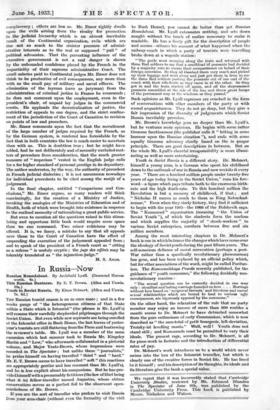In Russia—Now
THE Russian tourist season is on us once more ; and in a few weeks gangs of " the heterogeneous citizens of that State within a State which is Intourist" (the 'phrase is Mr. Lyall's) will resume their carefully shepherded pilgrimages through the Soviet Union. But even while new aspirants are being enrolled at the intourist office in Bush House, the last leaves of yester- year's tourists are still fluttering from the Press and bestrewing the reviewer's table. Mr. Lyall was a member of the same excursion which last summer took to Russia Mr. Kingsley Martin and " Low," who afterwards collaborated in a pictorial volume, and Major Yeats-Brown, whose impressions were recorded in The Spectator ; but unlike these " journalists," he prides himself on having travelled " third " and " hard." Mr. E. T. Brown seems to have travelled " soft " (his reactions are appropriately gentler and less resonant than Mr. Lyall's), and he is less explicit about his companions. But he has pro- vided himseff with a presumably fictitious (the law of libel being what it is) fellow-traveller named Augustus, whose obtuse conservatism serves as a perfect foil to the observant open- mindedness of Mr. Brown.
If you are the sort of traveller who prefers to visit Russia from your arm-chair (without even the formality of the visit
to Bush House), you cannot do better than get Russian Roundabout. Mr. Lyall extenuates nothing, and sets down nought without the touch of malioe necessary to make it readable. He has a lively gift for the description of people and scenes—witness his account of what happened when the railway-coach in which a party of tourists were travelling broke down at a wayside station:
" The guide went snooping along the train and returned with three Red soldiers to say that a coachload of peasants had decided by a majority vote to vacate their compartment on behalf of their foreign comrades. So they all thanked them very much and picked up their luggage and wont along and just got there in time to see the throe Rod soldiers pushing the peasants out of one end of the coach with their rifle-butts as they came in at the other. So they got in and tho train started off again, and all the dispossessed peasants assembled at the side of the line and throw groat lumps of the permanent way at the windows as they passed.'
Such opinions as Mr. Lyall expresses are couched in the form of conversations with other members of the party or with casual acquaintances. They do not "go deep, but they give a fair impression of the diversity of judgements which Soviet Russia inevitably provokes.
Mr. Brown's knowledge goes no deeper than Mr. Lyall's, but he ventures more opinions. He begins with some rather tiresome facetiousness (the publisher calls it " letting in some humour upon the Russian situation "), and ends with some equally tiresome advocacy chiefly based on the to quoyue principle. There are good descriptions in between. But on the whole Mr. Lyall's cheerful irresponsibility is more illumi- nating as well as more entertaining.
Youlh in Soviet Russia is a different story. Dr. Mehnert, himself a young man, is a German who spent his childhood down to the outbreak of war in Russia and now revisits it every year. " There are a hundred million people under twenty-five years of age today living in the Soviet Union," runs his fore- word—a figure which pays tribute both to the enormous birth- rate and the high death-rate. To this hundred million the Revolution is but a memory, of childhood, if that ; and " Nicholas II means as much to them as King Nebuchad- nezzar." Even when they study history, they find it sufficient to begin with the year 1905—the 1066 of the Bolshevik saga. The " Komsomol " organization (meaning " the Union of Soviet Youth "), of which the students form the nucleus and which supplies the majority of " shock-workers " to various Soviet enterprises, numbers between five and six million meMbers.
Among the most interesting chapters in Dr. Mehnert's book is one in which hetraces the changes which have come over the ideology of Soviet youth during the past fifteen years. The self-eonscious defiance of moral convention (perhaps a post- War rather than a specifically revolutionary phenomenon) has gone, and has been replaced by an official policy which, but for other associations of the word, might be called Puritan- ism. The Komsomolskaya Pravda recently published, for the guidance of" youth communes," the following decidedly non- revolutionary maxims :
" The sexual question can be correctly decided in one way Only : steadfast and lastingo founded on love . . . Marriage without love based on ` reciprocalfavours; and frivolous and casual sexual relationships which are bound to load to various ugly consequences, are vigorously opposed by the commune."
On the other hand, the relaxation of the rule that no party member may enjoy an income of more than 800 roubles a month seems to Dr. Mehnert to have detracted somewhat from the pure enthusiasm of early Communism, which is now described as " the sum-total of petit bourgeois, left-deviation, Trotsky-ist levelling mania." Well, well I Youth does not stand still ; and Komsomols must be permitted to vary their ideals. The present rage, according to Dr. Mehnert, is all for piece-work in factories and the introduction of differential
rates of pay.
Dr. Mehnert's work introduces us to a world which never swims into the ken of the Intourist traveller, but which is clearly one of the creative forces in Soviet life. He has lived in it himself ; and his description of its thoughts, its ideals and its literature give the book a special value.










































 Previous page
Previous page